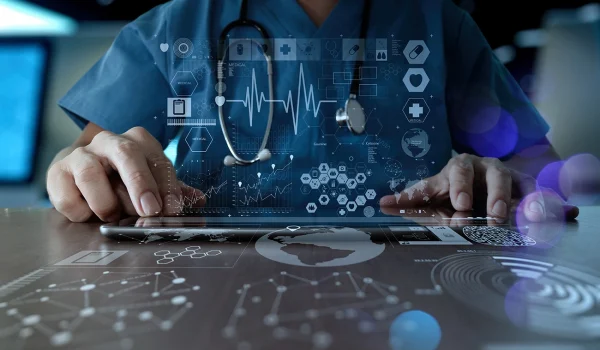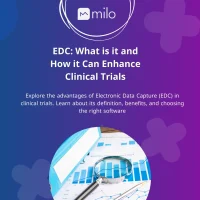Continuing our series of blogs in which we highlight the benefits of implementing the most recent technology advancements to enhance clinical trials, this article discusses electronic data capture (EDC) and how it can benefit clinical trials research.
In this article, we define electronic data capture before listing some of its benefits. Then, we provide some insights on how to choose software, to help companies that are considering implementing one. Save this article for future reference and share it with someone who might be interested in the subject.
What is Electronic Data Capture?
Electronic data capture systems are programs used to collect, classify, share and store participant’s data in clinical trials. They may be used in all kinds of clinical studies, from the simplest to the more complex ones. EDCs replace traditional paper-based data collection and storage, facilitating data security and reusability.
One of the main aspects of these software that make them an efficient tool for data capture in clinical trials is their cloud-based data storage system. Researchers and other stakeholders can access forms filled by participants and data from remote monitoring from anywhere, using their own devices.
As opposed to traditional data collection systems, digital data capture can help sponsors and CROs save resources, as they do not need to maintain large storage units to secure patient’s data. Instead of printing and sending paper forms, which need to be filled in and also sorted and filed manually, researchers can design electronic interactive forms that can be easily shared with participants and are automatically saved on-line.

How EDCs can Enhance Clinical Trials ?
The main challenges in clinical research are budget and time constraints. Problems with patient recruitment and retention are also a frequent concern of researchers. Moreover, it can be challenging to ensure regulatory compliance and speed up market access while staying on budget and prioritizing data quality. This is a list of benefits of using an electronic data capture system that help researchers overcome these challenges:
- It broadens and streamlines data collection: EDCs allow for automated real-world data (RWD) collection and systems can be designed to verify and classify data before it is sent to the database. All of this happens more quickly than if it had to be done manually by humans. The software can also be designed to prevent inaccurate data entry, saving time that would be spent on corrections.
- It reduces paperwork: digital data collection and storage reduces the need for printing and filing documents, while also being a more environmentally friendly option that helps companies to stay on budget.
- It supports global and more diverse clinical trials: unlike paper-based forms, online forms can reach people everywhere. Data can be provided and accessed anywhere, from any device, no matter where in the world the patient and the medical team are. EDCs systems are well adapted to international research, by using international terminology for symptoms and names of diseases.
- It plays an important role in speeding up market access, since the time needed to have results and final reports to submit to regulatory agency is significantly reduced by data entry and analysis automation.
- Communication is enhanced by EDCs, as it allows data to be easily shared with relevant personnel. A lot of extra time is needed to share data collected through traditional data capture systems, as we have to consider the time for copying and mailing paper forms, for example. With electronic data capture, the same database can be accessed by several people simultaneously, downloaded and printed if necessary, and it can be discussed at the same time it is visualized in an online meeting.
- It makes trials more flexible and adjustable, as feedback from participants and researchers can be immediately considered and incorporated into the study. Unlike printed documents, digital forms can be edited and updated easily with no extra costs.

How to Choose an Electronic Data Capture Software ?
If you are interested in implementing an EDC to conduct medical device or drug development clinical trials, you might have already made a preliminary search and realized that the options available are many. Choosing the right software might be tricky, since what worked for another manufacturer might not be ideal for the kind of clinical trial your company is interested in.
Moreover, relying only on client reviews and marketing descriptions might not be a good idea, as the way data capture is managed may vary depending on the therapeutic area you work in and even how your own team of researchers prefer to work. Our advice is that you try to evaluate your options from your company’s own perspective, and do not hesitate to ask for demos and ask questions. We provide a checklist to help you with that:
- Check if the solution ensures compliance with privacy and data protection regulations
- Evaluate the software interface: you are looking for user-friendly programs that are also adaptable to different kinds of users from different countries
- Does the software integrate with other digital tools you already use?
- Check how flexible the tool is and if it allows you to reuse data collected in one trial and create reusable eCRF templates
- If possible, test the option of auto checks and data limits to reduce errors and the built-in metrics reporting features
And finally, assess how approachable and efficient the provider’s customer support is. Do they have technical advisors to help your team if needed?
We hope this article has answered the questions you might have had about EDCs and inspired you to consider using these solutions to enhance your clinical trials.
Partnering with a Contract Research Organization (CRO) is the best way to initiate or accelerate your company’s digital shift. From choosing the right software to assisting staff, all stages of the trial’s electronic data capture will be taken care of by our expert team. Contact us today to learn more.
Summary
- Electronic data capture systems are programs used to collect, classify, share and store participant’s data in clinical trials
- As opposed to traditional data collection systems, digital data capture can help sponsors and CROs save resources, as they do not need to maintain large storage units to secure patient’s data.
- Electronic data capture can broaden and streamlines data collection, reduce paperwork, support global and more diverse clinical trials, play an important role in speeding up market access, enhance communication and make trials more flexible and adjustable
- Some points to consider when choosing an EDC software is compliance with privacy and data protection regulations, the software interface, integration with other tools, metrics reporting features and customer support







